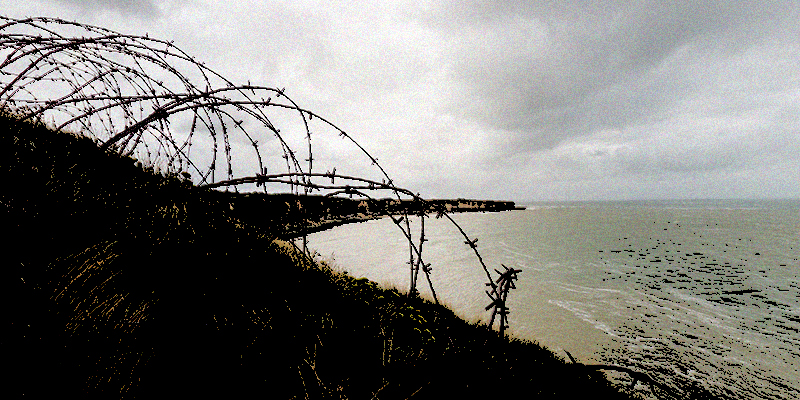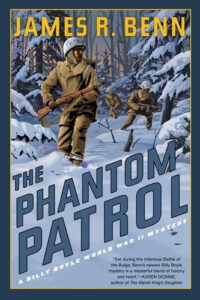So, we’ve all read The Catcher in the Rye by J.D. Salinger, right? Maybe it was an assigned reading in high school or college, or a voluntary read to see what the fuss was all about. Perhaps you were drawn to the theme of youthful alienation and the rejection of the phoniness of the adult world.
I know I was.
In college, I read Salinger’s short stories as well, understanding them to lesser and greater degrees. But what I totally missed in all of Salinger’s works was the inextricable link to his personal experience of the Second World War.
Several decades ago, a rereading of The Catcher in the Rye left me cold, even slightly irritated at what I perceived as Holden Caulfield’s self-centered view of the world. But I totally missed the point once again. He was consumed with grief over the death of his younger brother Allie.
Death and grief, two horrible outcomes of combat in the Second World War. Salinger knew them well. As a sergeant in the 4th Infantry Division, he landed in the second wave at Utah Beach on D-Day and fought through several major battles and into Germany.
Holden Caulfield was there, too, in the form of seven typewritten chapters Salinger carried ashore in Normandy in his rucksack.
Salinger served with the US Army Counter Intelligence Corps, attached to the 12th Regiment of the 4th Division. The duties of the CIC included protecting personnel from threats posed by enemy agents, investigating breaches of security, and interrogating enemy prisoners near the front lines. Salinger’s proficiency in French and German was constantly employed as his unit fought in the weeks and months following D-Day. The 12th Regiment landed with 3,100 soldiers on June 6th. By the end of that month, only 600 were left standing.
Death and grief.
*
Salinger’s unit was also involved in the hunt for Nazi collaborators among the French. His CIC partner and best friend throughout the war, John Keenan, reported that in one city they had just picked up a collaborator when a crowd heard of the arrest and jumped them. They grabbed the prisoner and beat the man to death in front of them. Salinger and Keenan were helpless observers.
Even before D-Day, Salinger was witness to a horrific tragedy in the cold waters of the English Channel. While practicing invasion landings off the Devon coast near Slapton Sands, ships carrying men from his division were attacked by German torpedo boats. Over seven hundred men died, more deaths than at any single beach on D-Day. The disaster had to be covered up, and the job fell to Salinger and the other CIC men. Their role was to ensure that the anguished survivors told no one about the death of their brothers-in-arms.
Death and grief suppressed.
It was not long after this event that Salinger wrote “For Esmé—with Love and Squalor.”
In this story, Sergeant X has just been discharged from an army hospital, clearly suffering from combat fatigue. He can’t concentrate, his writing is illegible, and his hands shake so much he can’t roll a sheet of paper into the typewriter. His face jumps with nervous tics, and he occasionally feels his mind “dislodge itself and teeter, like insecure luggage on an overhead rack.”
Sergeant X receives a package from Esmé, a young girl he met before going into combat. She’s sent him a letter and a shockproof watch that belonged to her father. Her letter concludes with this postscript:
P.S. I am taking the liberty of enclosing my wristwatch which you may keep in your possession for the duration of the conflict. I did not observe whether you were wearing one during our brief association, but this one is extremely water-proof and shockproof as well as having many other virtues among which one can tell at what velocity one is walking if one wishes. I am quite certain that you will use it to greater advantage in these difficult days than I ever can and that you will accept it as a lucky talisman.
Charles, whom I am teaching to read and write and whom I am finding an extremely intelligent novice, wishes to add a few words. Please write as soon as you have the time and inclination.
HELLO HELLO HELLO HELLO HELLO HELLO HELLO HELLO HELLO HELLO
LOVE AND KISSES CHARLES
It was a long time before X could set the note aside, let alone lift Esmé’s father’s wristwatch out of the box. When he did finally lift it out, he saw that its crystal had been broken in transit.
He wondered if the watch was otherwise undamaged, but he hadn’t the courage to wind it and find out. He just sat with it in his hand for another long period. Then, suddenly, almost ecstatically, he felt sleepy.
A shockproof watch, shattered in transit, which Sergeant X holds as he considers the depth of the damage. But the childlike greeting from Charles calls to him, and he feels sleepy. Sleep, which possesses curative powers for soldiers suffering from combat fatigue.
“And I can’t be running back and forth forever between grief and high delight.”
-Franny and Zooey
Salinger’s unit was one of the first to march into liberated Paris, where he engaged in prisoner interrogations. In my novel The Phantom Patrol, the 19th in the Billy Boyle WWII Mystery Series, I make use of this historical circumstance to bring CIC Agent Salinger into the narrative. As he investigates the murder of a fellow CIC agent, Salinger is drawn into Billy Boyle’s assignment to track down a murderous gang of art thieves.
But my fictional tale treats Salinger gently compared to what the war threw at him. After the battle for France, his division was chewed up in The Hürtgen Forest, a densely forested area on the Belgian-German border, thick with pillboxes and heavily defended villages. Casualties were heavy. Knowing what Salinger went through there, as I reread the following lines from Chapter 16 of The Catcher in the Rye, I had a dawning understanding of what he was getting at.
Anyway, I keep picturing all these little kids playing some game in this big field of rye and all. Thousands of little kids, and nobody’s around—nobody big, I mean—except me.
And I’m standing on the edge of some crazy cliff. What I have to do, I have to catch everybody if they start to go over the cliff—I mean if they’re running and they don’t look where they’re going I have to come out from somewhere and catch them. That’s all I’d do all day. I’d just be the catcher in the rye and all.
All the little kids playing some game, going over that cliff.
Things only got worse as the war dragged on. Salinger was at the Battle of the Bulge in the freezing cold, then on into Germany as the spring of 1945 rolled around. Writing to a friend, he said:
I dig my fox-holes down to a cowardly depth. Am scared stiff constantly and can’t remember ever having been a civilian.
Salinger wrote whenever he could. One soldier stated that during a bombardment, Salinger crawled under a table and continued to type on his portable typewriter.
In April 1945, he helped liberate the Kaufering concentration camp, a sub-camp of Dachau in southern Germany. The SS had tried to exterminate the surviving prisoners by burning them alive in a locked building.
He later told his daughter:
You never really get the smell of burning flesh out of your nose entirely, no matter how long you live.
After the surrender of Germany, Salinger had himself admitted to a German hospital for combat fatigue. He apparently wished to avoid the stigma of an official nervous breakdown diagnosis and chose a private hospital instead of a US Army facility. After his release, he stayed on with the army and joined in the hunt for Nazi war criminals.
For me, no other short story encapsulates Salinger’s reaction to the war more fully than “A Perfect Day for Bananafish.” First published by The New Yorker in 1948, it features Seymour Glass, who appears in other stories. Seymour is on vacation with his wife, Muriel, in Miami and has just been discharged from an army hospital for an assumed psychiatric disorder. His wife’s mother is very concerned with his erratic behavior, but Muriel insists all is well. While everyone else is putting the war behind them and enjoying peace with their prosperity, Seymour is alienated and alone.
After a day at the beach, Seymour shoots himself in his hotel room while his wife naps.
In one of his rare interviews, Salinger said the character “was not Seymour at all but… myself.”
Finally, I have come to understand Salinger’s writing. It was not about adolescent angst and melodrama. It was about the wounds of war and the pain of remembering. At the end of Catcher, Holden Caulfield has the final word, hinting both at the repression of grief and, at the same time, the possibility of healing.
“Don’t tell anybody anything. If you do, you start missing everybody.”
Missing everybody. All his buddies, all the dead soldiers, all the victims, all the kids in that field of rye.
***


















